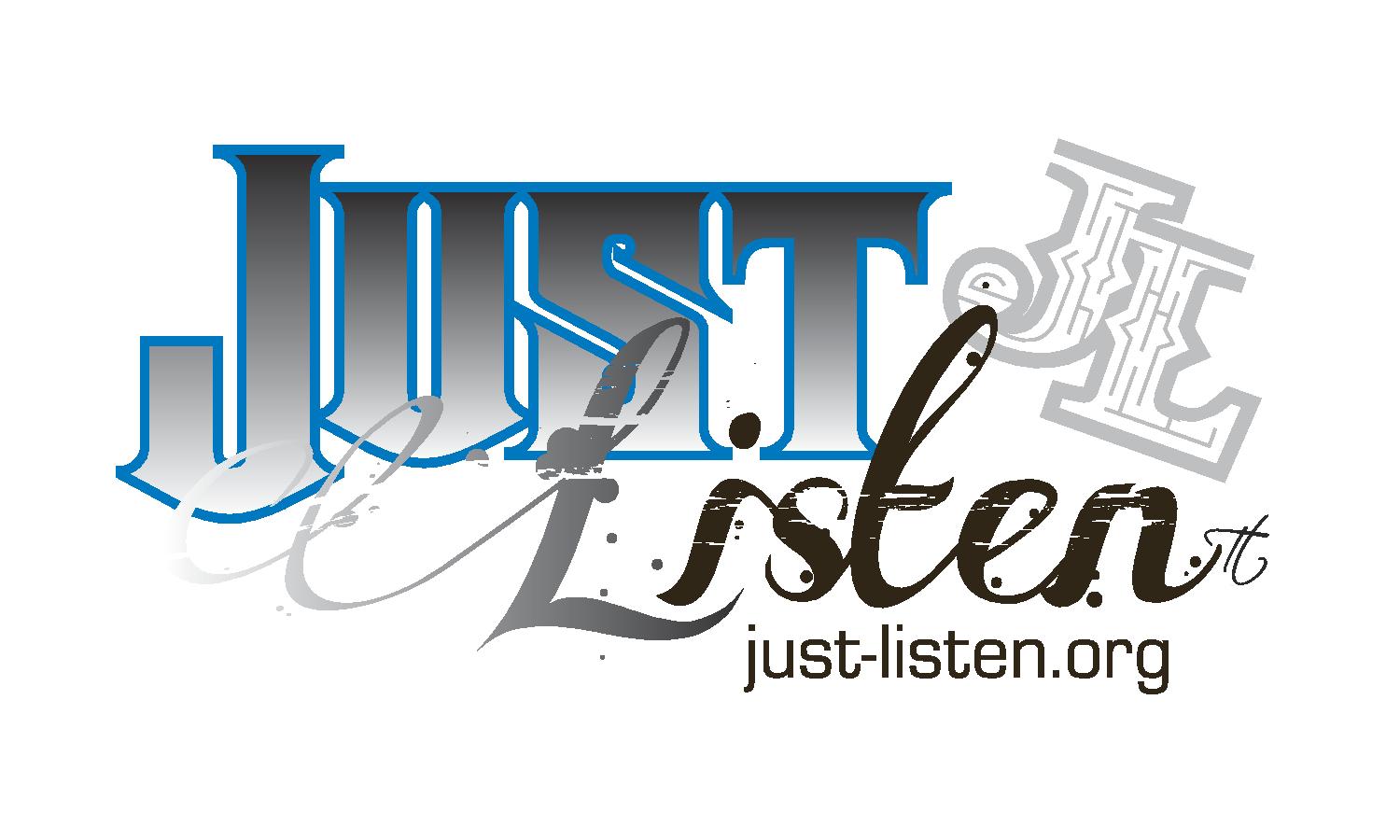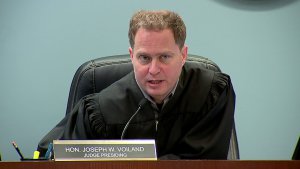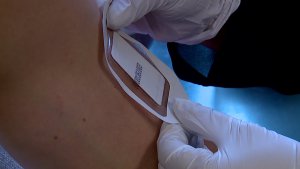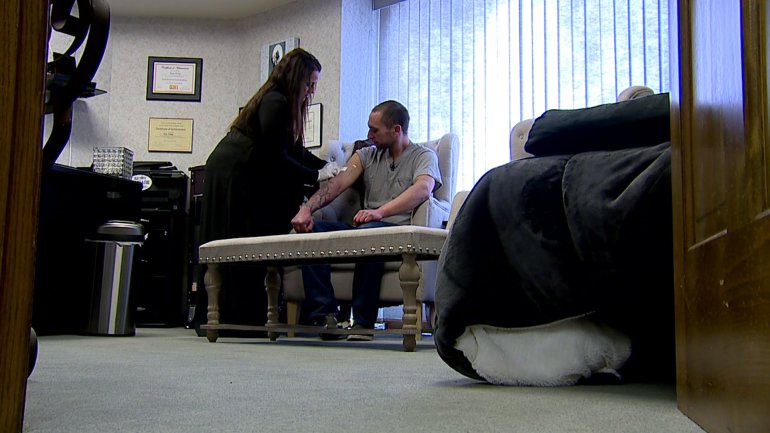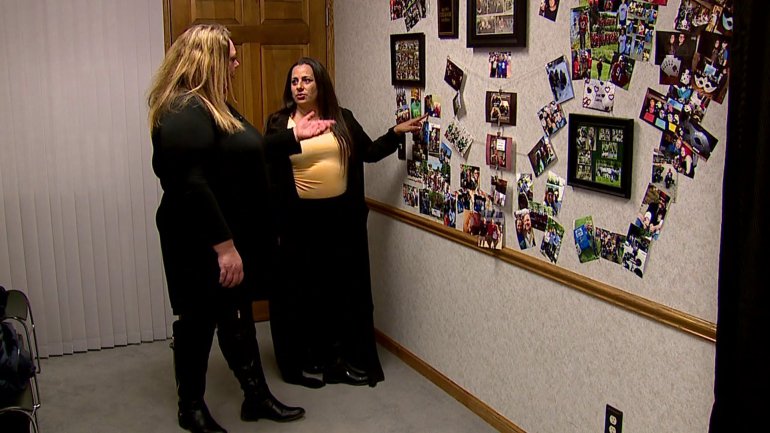‘They don’t need to sit in a jail cell’: Mequon non-profit partners with Ozaukee County judge to help people facing drug charges
POSTED 9:17 PM, APRIL 5, 2018, BY ANGELICA SANCHEZ AND LEEANN WATSON, UPDATED AT 09:41PM, APRIL 5, 2018
OZAUKEE COUNTY -- A small patch can identify any drugs in a person's system, but it's how that patch is being used in Ozaukee County that's making a difference. There's a partnership that's helping keep people out of jail and off drugs.
Joseph Voiland, Ozaukee County Judge
If you're accused of a crime in Ozaukee County it's possible you'll walk into Judge Joseph Voiland's courtroom. If you're facing felony drug charges, Judge Voiland may have you walk into Just Listen.
"I order them as a condition of their bond to have 24/7 drug monitoring," Voiland explained. Voiland partners with the Mequon-based non-profit to administer pre-trial drug monitoring. It's all done through a small patch that absorbs sweat. The drug sweat patch monitors drugs in a person's system 24/7.
"If you consume anything it's going directly here to the patch and we will know," explained Tina Perry, the founder of Just Listen.
"It will test every type of drug, basically. So, it goes from opiates to heroin, to angel dust," said Suzi Nietzke, a recovery coach at Just Listen. "It, also, gives you a percentage of how much is in that user's system."
Phil Sousa knows exactly how the process works because he ended up in front of Judge Voiland.
Tina Perry, the founder of Just Listen, applies a drug monitoring patch to Phil Sousa.
"I had gotten pulled over and I got caught with illegal substances on me," Sousa said.
As part of his bond, he's wearing a patch at all times.
"It's either this or sitting in jail. So, I'll choose this every day," Sousa said.
Voiland says without the patch, people out on bond aren't always held accountable.
Tina Perry and Suzi Nietzke in the Just Listen office.
"They would get a bond sheet that says no illegal drugs and it was pretty much worth the paper that it was written on because we would get people back over and over and over again," Voiland said.
"There's no way around it. You cannot cheat the patch," Sousa said.
But when someone like Sousa ends up at Just Listen, they're getting more than a patch.
"I've seen such a problem with drug use with children and adults and how it affects families is absolutely horrible," Perry said.
Perry once struggled with addiction and her experience is one of the reasons she founded Just Listen.
"Everybody's road to recovery is different," Perry said. "'So what I did was think back to when I was in rehab and what did I get out of it? Why am I still clean today from cocaine? Why? There has to be a reason? So, there is other people that need help."
Her organization offers that kind of help with its programs like recovery coaching.
"I'm not a counselor. I'm a coach. A coach is a little bit different because you walk side-by-side with somebody," Nietzke explained.
Nietzke says she's first-hand the impact drugs can have.
"In 2017, I attended 10 funerals for overdoses," Nietzke said.
So, when a court-ordered client ends up in the Just Listen office -- the patch is only the beginning.
"They need help. They don't need to sit in a jail cell. They have to have help," Nietzke said.
"We talk to them in the office. They have the social media connection with us. They can text us. We even reach out to them," Pery said.
Sousa says he's grateful Judge Voiland sent him to Just Listen.
"It's nice to be surrounded by positive people and have support," Sousa said.
Perry and Nietzke are too.
"We help save people`s lives," Perry said.
"We're all on this mission to help," Nietzke said.
Just Listen's services go beyond drug monitoring and recovery coach. They offer a recovery support group the first Thursday of every month and support group for family and friends of addicts the second Tuesday of every month.
In addition, they offer the Just Listen program, which is a community and educational outreach programs for teens, young adults, and families. You can learn more about those events on their Facebook page HERE.
FILED IN: DOSE OF REALITY
Wisconsin Voices for Recovery receives $1.4 million grant to combat opioid abuse
Posted by Dean Robbins | Jul 6, 2017 | News, UW News |
There’s new hope for those coping with opioid addiction in Wisconsin, thanks to a one-year, $1.4 million grant awarded to Wisconsin Voices for Recovery—a statewide peer-run network housed at the University of Wisconsin-Madison’s Division of Continuing Studies.
The grant is part of $12 million in federal funding awarded to the state of Wisconsin through the federal State Targeted Response to the Opioid Crisis Grant. The state Department of Health Services chose to work with Wisconsin Voices for Recovery because of its expertise in the field of behavioral health, outreach to individuals, and extensive network of organizations supporting recovery across the state.
Following recommendations from the Governor’s Task Force on Opioid Abuse, Wisconsin Voices for Recovery will create a “recovery coaching” model around the state. Unique in the nation, this model will employ a network of recovery coaches in emergency department settings who will aid those struggling with opioids.
Wisconsin Voices for Recovery rallies at the state Capitol.
“The goal is to expand access to treatment and recovery support services, cut back on emergency department recidivism, and reduce opioid-related overdose deaths,” says Caroline Miller, director of Wisconsin Voices for Recovery. “We will engage directly with communities and community organizations by providing seed grants to begin this important work.”
Turning the numbers around
Caroline Miller: ‘This is an amazing opportunity to save lives.’ (Photo by David Giroux)
Key to the effort is education. The project will leverage UW Continuing Studies’ expertise to create online training materials and other resources for recovery coaches, health-care providers, and community organizations.
Since the early 2000s, Wisconsin has experienced a surge in opioid abuse, with the overdose rate increasing more than fivefold. Over the last decade alone, the number of opioid-related deaths in Wisconsin has nearly doubled. According to a 2016 report by the Centers for Disease Control and Prevention, the state’s rate of drug and opioid overdose deaths per 100,000 population exceeds the national average.
With the new grant, Wisconsin Voices for Recovery hopes to turn those numbers around.
“We will reach as many parts of state as we can, targeting areas of greatest need,” says Miller. “This is an amazing opportunity to save lives.”
HEROIN
Ending the addiction cycle
Editor’s note: This is the second part of a two-part series on heroin addiction.
By Ken Merrill - Daily News
Dec. 30, 2014
The chances that a heroin addict can simply decide to quit — and stay clean — are slim.
Until recently, the dominant thinking in the medical community was that addiction is a disease. People with addictions aren’t bad people, they’re just sick, we were told.
That’s changing.
Research has shown that drug addiction alters brain structure until it becomes an uncontrollable compulsive behavior.
Over time, everything is about heroin. Interpersonal relationships — family, friends — are only worth what they do to enhance the addict’s ability to get more heroin.
The common thread between addiction and diseases is that left untreated, they can be fatal.
Tina Perry, 44, is a recovering cocaine addict with a child in prison for heroin-related offenses.
“There’s no face to an addict,” Perry said. “There’s no lifestyle to an addict. It’s an addiction that anybody — any race, any color, any age — could have.
“I’ve heard ‘Mom, this is a beautiful drug,’ but it destroys and wrecks lives,” Perry said. “You can teach your children this is not good, this is not the way to be ... it’s not ever the parents’ fault. It doesn’t matter if you come from money or if you don’t. The scenarios don’t matter.”
Perry started using drugs as a teenager in the late 1980s at the height of cocaine’s popularity.
After a suicide attempt — she slit her wrists at the end of a four-day party — she was forced into rehab.
“I completed the rehab and changed my life,” Perry said. “Done with the drugs, done with the lifestyle. I did not go back to the people who I hung around with. I couldn’t go back to the kids I partied with because I probably would have continued that lifestyle. Something just released in me. I didn’t want that life any more.”
It’s personal, too, for Jessica Geschke, director of Alcohol and Other Drug Abuse Services at Affiliated Clinical Services in West Bend and a street team coordinator for Rise Together, a support and advocacy group for recovering addicts.
Her brother’s a heroin addict — “two months clean” she said. “That’s why I got into this.
“My family has been through hell and back,” Geschke said. “I’m in recovery myself, trying to figure out the right way to do this balancing act so that I don’t enable his addiction.”
"Sure,” she said. “I’ve met lots of addicts who have quit without any type of services. They’ve been strong in their NA (Narcotics Anonymous) and their faith and they say ‘I’ve never needed treatment.’ “They detox at home by themselves,” Geschke said. “It’s horrible. It’s not something I would recommend because you don’t know how long it’s going to last.”
Nadine Machkovech, 21, was able to detox and stay clean without a formal rehab program.
Now a recovery coach and street team coordinator for Rise Together, Machkovech pointed to two events that led to her recovery.
“I lost my grandma and a close friend died of a heroin overdose,” Machkovech said. “I had a lot of guilt and shame — why had it taken him instead of me?”
After squandering the inheritance she received from her grandmother on an extended drug binge, Machkovech came clean.
“When I quit using I surrounded myself with really healthy people,” she said. “I was with my sister and her husband and I was doing 12-step support groups and going to church. The first couple of months after I stopped using it was hard to even think clearly. For so long, the drugs were making all the decisions for me. It was hard for me to understand how a person lives a normal life.
“Without my faith I know I wouldn’t be where I am today,” Machkovech said. “I finally realized that I had some kind of purpose in life, that I was put on earth for a reason. Two weeks after that I met Doug (Darby) and Anthony (Alvarado) through Rise Together and I started sharing my story. I found my purpose in life through that.”
Darby and Alvarado are cofounders of Rise Together.
Steve Dahlen is an alcoholic. He’s been sober since April 8, 2008, and works as a house manager at Exodus House, a transitional care facility in Kewaskum for alcoholics and drug addicts. Most of the residents are heroin addicts.
“No one wakes up one day and says ‘I think I’ll be a heroin addict,’” Dahlen said. “It’s something they get into and as they progress their life gets more and more out of control.”
Recovery is “a long process,” Dahlen said. “It’s not just 90 days at the Exodus House and it’s not just getting off the substance. It’s a lifestyle change.
“That person you see that’s addicted, doing terrible things, it’s not the person, it’s the drugs,” Dahlen said. “We made bad choices. Once you take that drug away and you see them, six, nine months later he’s a whole other person. It’s not the person, it’s the drugs that turned him into that.”
For all its advances, the medical community has been unable to develop a solution. There’s no magic bullet to cure addiction.
“It’s a chronically relapsing disease,” said Geschke. “It’s impossible to tell who will be successful” in rehabilitation and recovery.
Dahlen said addicts have to hit “rock bottom” before they’re ready to change.
“The rock bottom for me was being arrested, taken out of my house and not remembering,” he said. “I was the town drunk in Jackson.”
He sees people at rock bottom.
“When people come into treatment, when you see the look on their face, they’re very desperate,” Dahlen said. “When you talk to them after 30 days of treatment they’re a totally different person. Sometimes they come back a year later that they’re sober, they got married, they’ve got kids on the way, they’ve got a house, a good job. You never know what to expect of a resident when they come to us.”
Dahlen said his work “makes me feel good instead of thinking about all the crap I did.”
Katie Jones, a recovering heroin addict, said criminal activity to support her habit was, ultimately, her salvation.
“I became very good at making checks. Forging names,” she said. “That’s ultimately how I got clean — I went to prison. I don’t have any drug charges ... more than for forgery. I ended up getting caught in 2004. I stayed in the House of Corrections in Franklin for a year.
“When I got out I just told myself I’m not doing that again. I remapped everything I ever thought and started working on myself and the things I needed to fix.”
Geschke faced a personal crisis recently after the overdose deaths of three clients.
“I was at a point where I just said ‘I’m done. I can’t watch people die.’ “But then I went to a meeting of Rise Together and had a fire built under me,” Geschke said. “I may end up burying clients but I help 50 more. I help people every day.”
Perry’s experience has led her to create a program she calls “Just Listen.”
“It’s a positive living, positive lifestyle and also a substance abuse awareness program,” she said. “I want my program to be so good that they will not want to use to be a part of my program.
“I have a race with myself,” Perry said. “It’s not only to help my child, but the public. The faster I can reach out to people, the faster I will be saving lives and helping families.”
